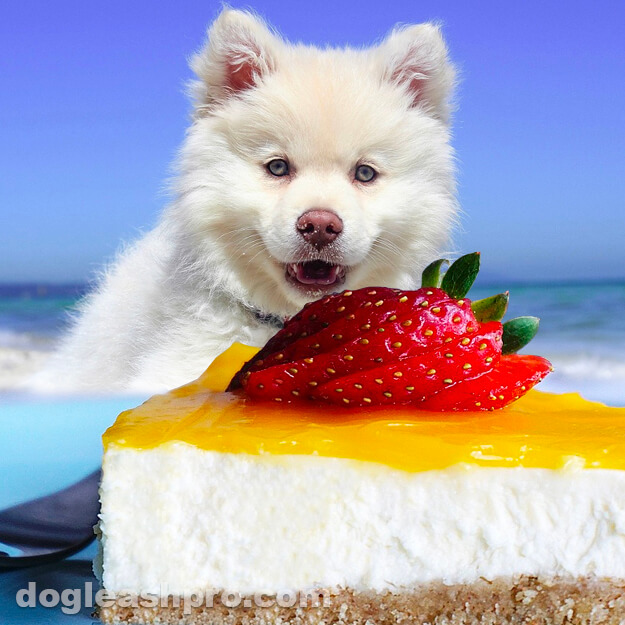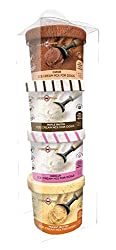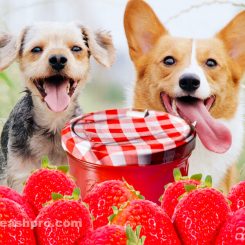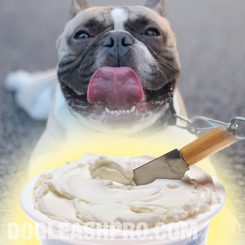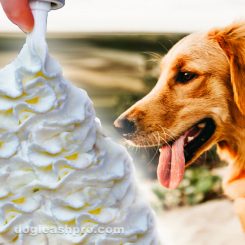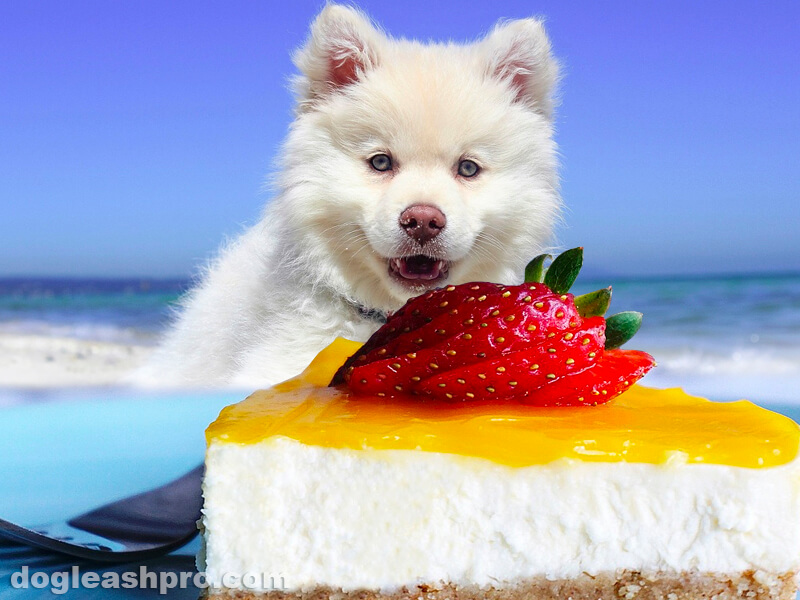
As I was making my New York-style strawberry Cheesecake yesterday, my two dogs sat and watched patiently. I like to make Cheesecake with lots of Cream Cheese to give it that creamy cheese flavor. After it cooled down, I had a taste and almost fed my pups a spoonful of it too when I wondered if Cheesecake is safe for dogs to eat.
Can dogs eat Cheesecake? Yes, while dogs can eat Cheesecake, it doesn’t mean that they should have it often or regularly because Cheesecake is high in fats, sugar, and dairy. For dogs that are lactose intolerant, eating even a little bit of Cheesecake can make them sick.
Table of Contents
Can dogs have Cheesecake?
Yes, dogs can have Cheesecake in moderation. To fully answer this question, let’s find out what Cheesecake is, what it is made of, and the cooking method for making Cheesecake.
What is Cheesecake?
Cheesecake is a widely beloved dessert. Unlike regular cakes that consist of sponge and icing, cheesecakes are made of a thick layer of cream cheese with a thin base of crushed cookies.
Cheesecakes are available at most bakeries and grocery stores around the world. While the modern Cheesecake originated in 14th century England, the origins of Cheesecake can be traced back to ancient Greece.
What is Cheesecake made of?
Cheesecakes usually consist of a thick top layer made with cream cheese, eggs, and sugar, with a thin base made with crushed cookies, crackers, or pastry. There are numerous variations and flavors of Cheesecake, but the main components are more or less the same.
How is Cheesecake made?
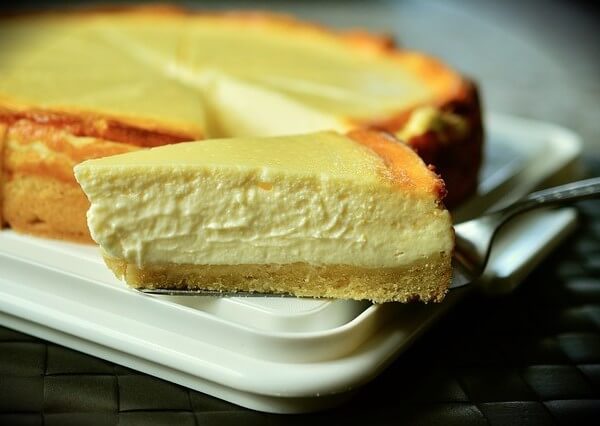
Classic Cheesecake is made by mixing heavy cream cheese, Sour Cream, sugar, eggs, and desired flavoring.
The mixture is poured on a crushed cookie base—usually Graham crackers—and baked using a water bath method or bain-marie. The water bath method is when the Cheesecake is gently baked in a pan that is placed inside another pan filled with boiling hot water inside the oven. This method is crucial because it helps give the Cheesecake its creamy consistent texture.
After baking, the cheesecake is slowly cooled to room temperature, then popped into the refrigerator or freezer.
Is Cheesecake bad for dogs?
The high dairy content makes Cheesecake unfit for dogs due to their inherent sensitivity to lactose. But lactose intolerance aside, Cheesecake is still pretty unhealthy for our canine companions. Some Cheesecake variations are flavored with chocolate, grapes, raisins, and nuts, making them downright toxic for dogs.
Let’s look at some standard Cheesecake components and find out which ingredients in a typical Cheesecake may be safe or harmful to our pooch.
What ingredients are in cheesecake?
1. Cheese and other dairy products (Harmful to dogs that are lactose-intolerant)
As we’ve mentioned above, dogs aren’t very good at digesting lactose-rich foods. Cheesecakes are made with soft cheese or cream cheese—both of which are naturally high in lactose. Other possible dairy derivatives in cheesecake include heavy cream, sour cream, butter, and curd cheese.
Eating too much dairy food can cause your dog to experience the following:
- Bloating.
- Dehydration.
- Lethargy.
- Vomiting.
- Abdominal pain.
- Diarrhea.
- Gas.
Both cream cheese and cream are also very high in fats. Dogs that eat fatty foods regularly may contract:
- Sluggishness.
- Weight gain.
- Heart disease.
- Digestion problems.
- Diabetes.
- Pancreatitis.
2. Sugar (Harmful)

Sugar isn’t toxic; that’s not to say it is entirely safe. Sugar isn’t something dogs need too much of in their daily lives.
Like other desserts, cheesecakes have copious quantities of sugar. The abundant sugar, combined with the high-fat content from cream and cheese, makes Cheesecake a nutritional nightmare for our furry friends.
Eating sweet treats excessively can cause these problems in dogs:
- Tooth decay.
- Nausea.
- Loss of appetite.
- Diabetes.
- Obesity.
- Diarrhea.
- Stomach soreness.
- Stomach inflammation.
3. Digestive cookies (Safe in moderation)
Cheesecake base is usually made with crushed digestive cookies or graham crackers, both of which are safe for dogs in moderation.
These cookies still contain sugar and butter: two ingredients that aren’t good for your canine family member’s health in the long run. But when it comes to dangerous elements in a Cheesecake, graham crackers and digestive cookies are of little concern.
4. Other toxic additives (Harmful)
There are thousands of Cheesecake recipes that call for a multitude of different ingredients. While none of those ingredients are toxic to humans, they can affect our four-legged companions very differently.
Popular Cheesecake additives like vanilla essence, chocolate, lemon, coffee, cinnamon, and raisins can make dogs severely ill. This is why owners should be cautious about what they feed their canine companions.
When shouldn’t you feed Cheesecake to your dog?
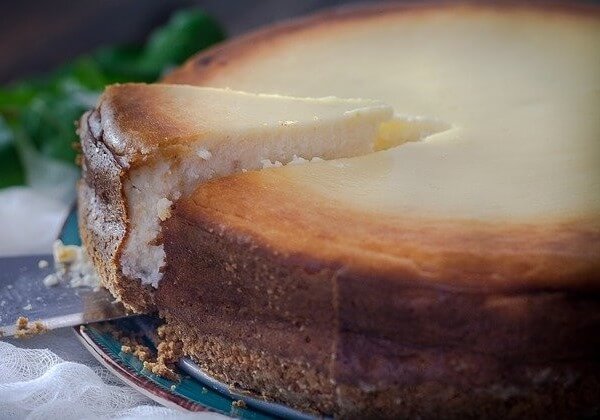
If your dog is diabetic, overweight, or lactose intolerant, they should avoid Cheesecake at all costs. A diabetic or overweight dog with already fragile health doesn’t need such sugary and fatty snacks or foods. Also, the high dairy content will trouble a lactose intolerant dog’s tummy.
Owners of smaller dogs should be cautious with foods high in sugar and fats. Toy dog breeds have a small daily caloric quota, which they can exceed very quickly by eating calorie-dense foods like Cheesecake.
Does Cheesecake provide nutritional benefit for your dog?
Cheesecakes are packed with unhealthy ingredients that outweigh their little nutritional value. The benefits you may expect from Cheesecakes can be found in safer and healthier foods. Feeding Cheesecake to your pooch doesn’t do their body any favors.
Danger of raisin Cheesecake
Raisins and grapes are widely used in desserts. But if you have a pet dog at home, you should avoid putting raisins or grapes in any food you make. This tiny fruit can be harmful in the smallest of quantities. Ingestion raisin Cheesecake can cause the following symptoms:
- Loss of appetite.
- Stomachache.
- Weakness.
- Dehydration.
- Excessive urination.
- Kidney failure.
Danger of chocolate Cheesecake
Chocolate is a known toxin for dogs. Still, many dog owners fail to grasp the dangers of using chocolate in desserts. Chocolate has two ingredients that make it dangerous for dogs: caffeine and Theobromine. The combined effect of these two chemicals results in chocolate toxicosis.
Dogs that accidentally eat chocolate can experience the following symptoms:
- Frequent urination.
- Extreme thirst.
- Muscle spasms.
- Vomiting.
- Diarrhea.
- Stomach pain.
- Elevated or increased heartbeat.
Check out: Can Dogs Eat White Chocolate? to learn why dogs should stay away from all kinds of chocolate, including White Chocolate. The nutritional content in White Chocolate will surprise you!
Can dogs eat Cheesecake crust?
The cheesecake base, or crust, is made from digestive cookies, graham crackers, or cake sponge. All these are safe for dogs. However, they still contain sugar and butter. If you want to feed cookies or crackers to your pooch, better go with good old dog cookies.
What if my dog accidentally eats Cheesecake?
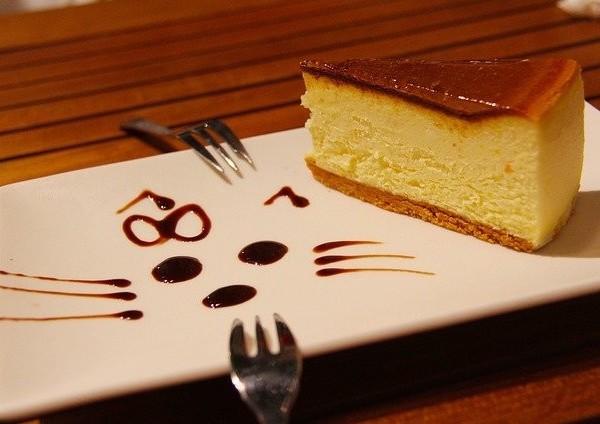
If your curious pooch takes a bite out of a plain Cheesecake, there’s no need to worry. Cheesecake isn’t inherently toxic and your dog will likely be fine.
For dogs that are lactose intolerant, they may have a few spells of vomiting and diarrhea. Make sure to give your four-legged friends plenty of water while they recover, as the whole ordeal can dehydrate them.
It will also help if you keep all human foods away from your pup for at least a couple of days.
If your canine companion has munched on a Cheesecake with raisins, chocolate, or grapes, the most immediate course of action would be to call your vet right away or a poison helpline.
Handy Hint: Most dogs are lactose-intolerant and can not properly digest dairy products like Cheese Balls or Cheesecake in this case. If you’re not sure whether your pooch is lactose-intolerant, give them a small piece and see if they have a negative reaction to it.
Symptoms to watch for
If the cheesecake your furry family member ate had chocolate, grapes, or raisins, you don’t need to wait for any symptoms to take your dog to the vet. It’s best to bring him to your vet immediately.
However, if you’re unsure if your pooch has consumed any toxic ingredients, you can look for signs of a life-threatening condition.
Symptoms of chocolate poisoning are:
- Vomiting.
- Diarrhea.
- Muscle spasms.
- Increased urination.
- Seizures.
Symptoms of grape or raisin poisoning include:
- Loss of appetite.
- Stomachache.
- Weakness.
- Dehydration.
- Excessive urination.
- Shaking.
Treatments if your dog has Cheesecake food poisoning
If your canine friends ate Cheesecake laced with some unsuitable ingredients, then the situation calls for urgent medical help.
For instance, chocolate is toxic to dogs in moderate to large quantities. A single bite out of a chocolate Cheesecake likely won’t do any long-term damage. However, a few slices can increase the danger significantly. Immediate veterinary assistance would be your best course of action.
The worst-case scenario would be the dog eating raisin or grape-flavored Cheesecake. This tiny fruit is lethal for our furry friends. Prompt medical assistance is crucial as it will save your pooch from meeting a grim fate.
Be sure to follow your vet’s instructions and advice while you both wait for professional medical help. Don’t try to do it yourself as it may potentially harm your pooch even more.
Dog-friendly, safe, and non-toxic alternatives to Cheesecake
Cheesecake is a sweet, creamy, and cheesy dessert. But now that you know how unhealthy it is for your four-legged friend, you may wonder what other options you have. Luckily, there are plenty of sweet, nutritious, and delicious alternatives to Cheesecake.
- Goji Berries are a superfood that can improve your dog’s immune system, reduce inflammation, and enhance their eyesight. Be sure to only feed Goji Berries to your pooch in moderation.
- Pumpkin is a natural immunity booster and makes for a succulent treat for dogs. The fiber content in pumpkin also improves digestion in dogs.
- Fruit yogurt is low in lactose and one of the safer dairy products for dogs. Add some freshly chopped fruits and you have a delectable doggy dessert.
- Cottage cheese. It makes a rewarding treat for dogs without dairy allergies. Cottage cheese is also low in fat and rich in proteins and vitamins.
- Peanut butter is an excellent alternative to creamy desserts. It is rich, buttery, and loved by most dogs.
- Apples are high in iron, fibrous carbs, and other vital nutrients. Make sure to remove the core and seeds as they contain cyanide.
- Carrots are tasty, sweet, and rich in essential vitamins. They make for delicious doggie treats. Carrots provide vital nutrients and will improve your furry friend’s dental health.
If you don’t have time to make non-toxic alternatives to Cheesecake, you may want to consider this ice cream treat for your pooch. This treat will have them wanting more!
How do I make Cheesecake for my dog at home?
Cheesecakes require lots of cream cheese and cream, making them unnaturally rich in fats. But if you want to give your dog the Cheesecake experience, you can make a much healthier version of it yourself.
Instead of using cream cheese, you can use yogurt or cottage cheese. You can also replace the cheese with mashed fruits, peanut butter, or mashed pumpkin for lactose intolerant dogs. Instead of using a graham cracker base, go with your dog’s favorite dog cookie.
So, can dogs eat Cheesecake?
While Cheesecake isn’t the worst thing to feed your pooch, it isn’t the best either. Even if the Cheesecake is free from any toxic ingredients, it is still a fatty, sugary dessert with lots of dairy products.
Your canine family member will not get any nutritional benefit from a Cheesecake and frequently indulging in this creamy confection will lead to a host of canine health problems.
Related Questions
Yes, dogs can eat blueberry Cheesecake, but in moderation. Unlike grapes, blueberries are harmless to dogs. However, it’s best to avoid having blueberry Cheesecake as a regular snacking option or treat.
Yes, dogs can eat strawberry Cheesecake, but in moderation. Strawberries are rich in vitamin C but they are also full of sugar. While strawberry Cheesecake isn’t toxic, it’s still pretty sugary and fatty.
Only very rarely and in small quantities. Strawberry Cheesecake ice cream is high in sugar, dairy, and fats. While strawberries are safe for dogs, strawberry Cheesecake ice cream isn’t very healthy.
Yes, dogs can eat raspberry Cheesecake, but in moderation. Raspberry is among the safe kinds of fruits for dogs. But putting it in a Cheesecake doesn’t mean the dog can have it regularly.
Only in theory. While Costco Cheesecakes don’t contain any toxic ingredients, they are very high in sugar, fats, and sodium, making them a very unhealthy option for dogs.
No, puppies should not have Cheesecake. Cheesecake is already a risky food for adult dogs; feeding it to puppies is an even bigger risk. Your baby dogs are better off avoiding this lactose-rich, fatty, sugary dessert altogether.
Yes, most cakes are bad for dogs. Cakes are rich in sugar, dairy, and may contain toxic ingredients like chocolate, coffee, macadamia nuts, raisins, and vanilla essence to satisfy the human taste buds and taste.
Almost all human foods pose a health risk to dogs. Foods that may not be toxic to dogs may still be unhealthy for dogs and provide little to no nutritional value. The same goes for Cheesecake—it is a human food that isn’t suitable for canine consumption.
If your furry friend isn’t allergic to dairy products, feeding them cream cheese won’t harm them. However, cream cheese is high in fats and sugar, so only a tiny portion given occasionally is enough.
DISCLAIMER: THIS WEBSITE DOES NOT PROVIDE MEDICAL ADVICE
The information, including but not limited to, text, graphics, images and other material contained on this website are for informational purposes only. No material on this site is intended to be a substitute for professional veterinary advice, diagnosis, or treatment. Always seek the advice of your veterinarian or other qualified health care provider with any questions you may have regarding dietary needs.
Resources:
https://en.wikipedia.org/wiki/Cheesecake
https://en.wikipedia.org/wiki/Graham_cracker_crust

With over five years of specialized experience as an animal writer, my expertise lies in dog nutrition, health, behavior, grooming, and training. I am dedicated to delivering helpful and informative content that caters to the well-being of our furry friends. My primary goal is to empower pet owners with knowledge and ensure our canine companions thrive in health and happiness. In my free time, I love volunteering at local dog rescue centers.
